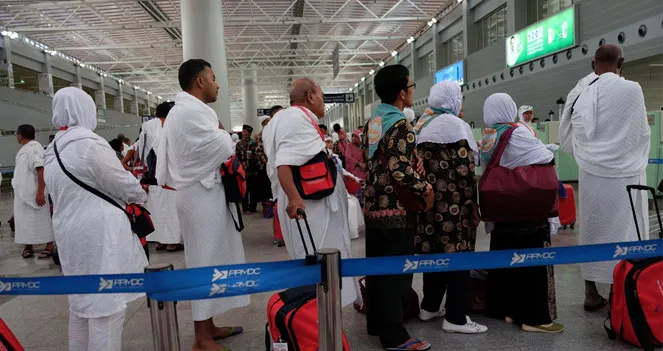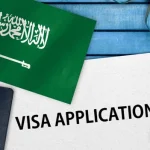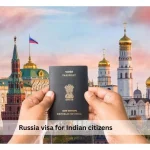The Umrah is a minor and non-compulsory pilgrimage that any able-bodied Muslim with the financial means to do so may undertake in order to gain the blessings and favour of the Almighty Allah.
Pilgrims looking to fulfil this religious calling must first obtain an Umrah visa as one of the prerequisites for entering the Kingdom of Saudi Arabia. Here’s all you need to know about the Umrah visa; its requirements, associated costs, and how to apply for one.
What is the Umrah visa?
Umrah is a small, non-mandatory holy pilgrimage for people of the Muslim faith residing anywhere in the world. This event takes place in Saudi Arabia. If you are performing Umrah, you must have an Umrah visa.
This pilgrimage is completed by visiting the holy city of Mecca in Saudi Arabia and performing a series of religious rituals. The trip is open to all Muslims worldwide, as mentioned above. So, if you are a citizen of India who wants to participate in this event and visit Saudi Arabia, you can too! You need to have a valid Umrah visa on hand to enter the country.
Do I need a visa to perform Umrah?
Unless you are a citizen of Bahrain, Kuwait, Oman, Qatar, and the UAE, you would first need to secure an Umrah visa or a visit visa in order to embark on the minor pilgrimage. Citizens from said countries may use their national ID Cards to enter Saudi Arabia.
Requirements for Umrah visa
You need to prepare the following documents before submitting your Umrah visa application form:
- Umrah visa application form.
- One recent passport photograph.
- Valid passport with a six-month validity period (from the date you submit your application).
- Purchased non-refundable flight tickets.
- Evidence of a relationship between female pilgrims and their ‘mahram’ (partner/brother/father).*
- Health insurance covering Covid-19 infections as well.
- Proof of meningitis vaccination at least ten days before traveling but not older than three years.
Important:
- Applicants with a non-Muslim name will be required to submit proof from their local masjids or Islamic organizations verifying that they are Muslims.
- The Ministry of Hajj and Umrah has announced that Umrah pilgrims from five countries – UK, Tunisia, Kuwait, Bangladesh and Malaysia must mandatorily provide their biometric data, including fingerprints in order to get an electronic Umrah visa.
Umrah Visa Processing Time
In normal circumstances, an Umrah visa takes five to ten days to finish processing, depending on your country of residence. But now the Saudi authorities have launched an electronic service for Umrah seekers to obtain their Umrah visa within 24 hours. Umrah seekers residing in countries all over the world may now directly apply through the Maqam platform.
After receiving the reference number for the application, applicants can log in to the national visa platform to complete and print their visas.
Umrah visa fees
The Umrah visa is free of charge but there may be fees associated with processing and other Umrah-related services. As of 2022, an Umrah visa application costs between $380 to $490. But, the visa fees are liable to change from country to country. For example, service fees from the UK cost £89 ($120), while from the US, they range anywhere from $173 to $220.
Umrah Visa Validity
The Umrah visa is valid for two weeks. But, if you are performing Umrah during Ramadan, you must leave by the last day of the holy month regardless of whether you have stayed two weeks or not.
Is Covid-19 Vaccination Requirements for Umrah 2022?
Prior to March 2022, to enter Saudi Arabia, you were required to be vaccinated against Covid-19 with one of the following vaccines approved by the Saudi (Pfizer/BioNTech, Oxford/AstraZeneca, Johnson & Johnson, Moderna Spikevax). However, now most of the Covid-19 restrictions, vaccination proof, and quarantine requirements for Umrah are no longer valid.
New Umrah Visa Rules For 2022
According to the Saudi Arabia, new rules apply for international pilgrims who want to perform Umrah in 2022. These are :
- Pilgrims who are not vaccinated against Covid-19 can perform Umrah if they can prove they were not infected with the virus or have not been in contact with an infected person.
- Pilgrims are no longer required to provide a PCR or rapid antigen test when arriving in Saudi Arabia.
- Pilgrims are no longer required to quarantine after entering Saudi Arabia.
- Masks and social distancing are no longer needed in public places. This includes social distancing at the Two Holy Mosques and all of the Mosques in the country (masks are still required indoors).
- Pilgrims are no longer required to register on the Muqeem app after arrival. However, those who have completed all the required vaccination steps are encouraged to register to show their immunization status on their Tawakkalna app.







